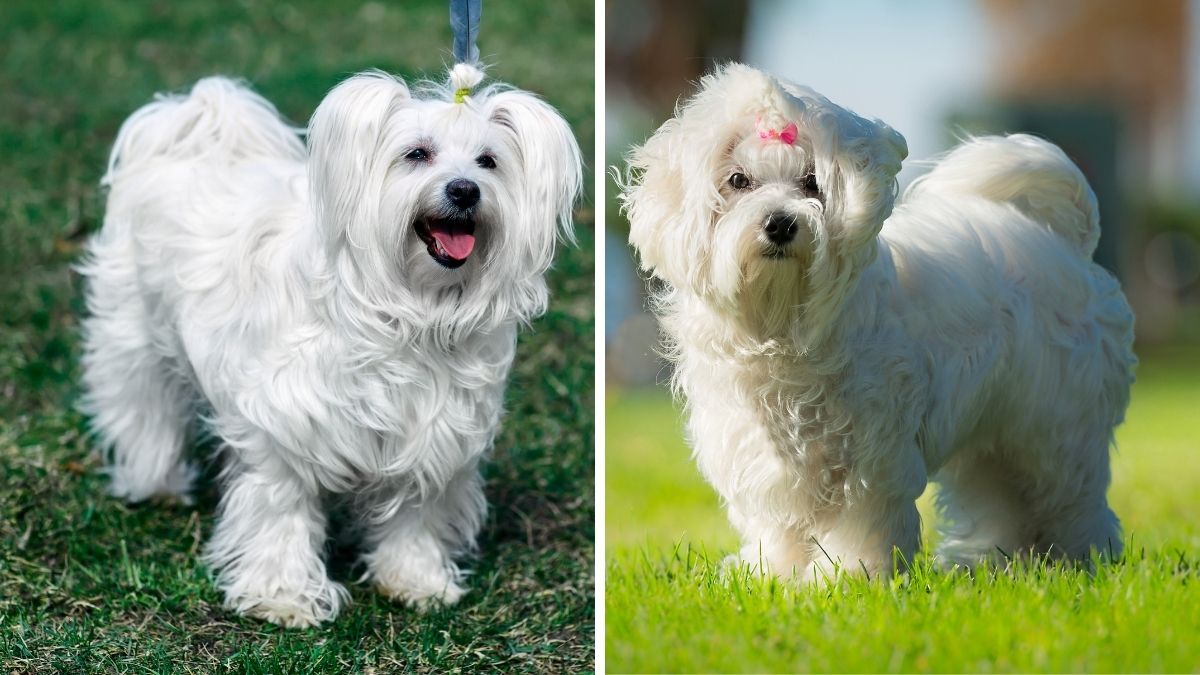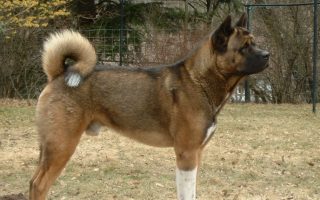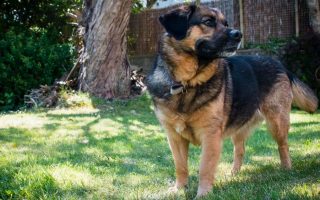The best way to confuse anyone is to have both a Maltese and a Coton de Tulear walk down the street consecutively.
The random observer would most likely not spot any obvious differences. These breeds look alike, and they also act the same way.
However, they are different breeds and shouldn’t be confused one for another.
It doesn’t matter which you choose for your household as both make good pets. But knowing the similarities and differences can help you pinpoint which one you prefer.
The Maltese or the Coton de Tulear? Let’s find out why they interlapse and what makes them stand apart.
Coton de Tulear vs Maltese – Basic Facts
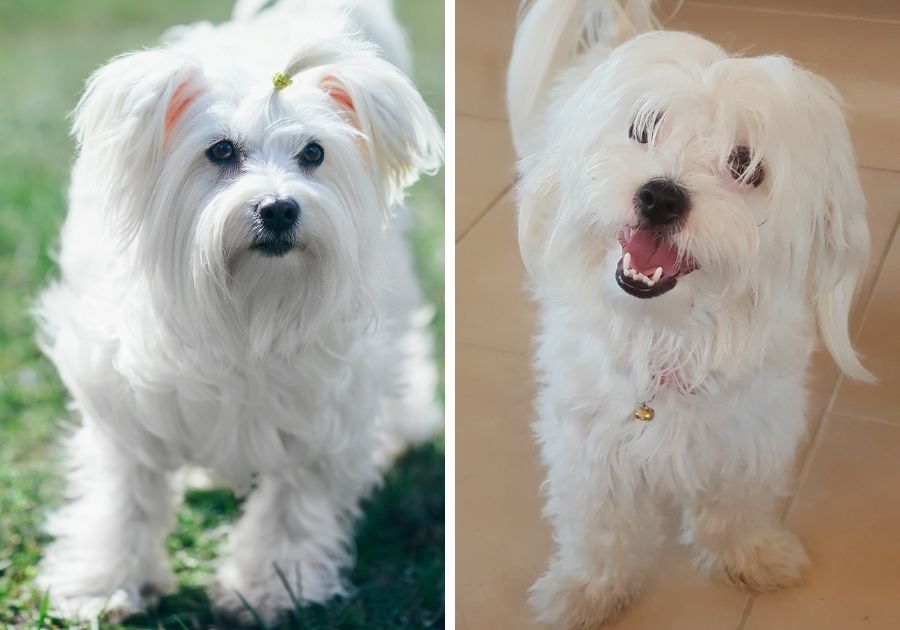
| Facts | Maltese | Coton de Tuléar |
|---|---|---|
| AKC Group | Toy Group | Non-Sporting Group |
| Height | 8 to 10 inches | 8 to 12 inches |
| Weight | 4 to 6 pounds | 8 to 13 pounds |
| Coat Type | Silky, straight | Soft, thick |
| Coat Colors | White | White |
| Temperament | Playful, affectionate, Sweet-tempered | Affectionate, playful, intelligent |
| Origin | Malta | Madagascar |
| Life Expectancy | 12 to 15 years | 14 to 16 years |
| Grooming Need | High | High |
| Energy | Average | Average |
| Trainability | Yes | Yes |
| Puppy Price | $600 to $2,000 | $2,000 to $4,000 |
Coton de Tulear Dog Breed – All You Should Know
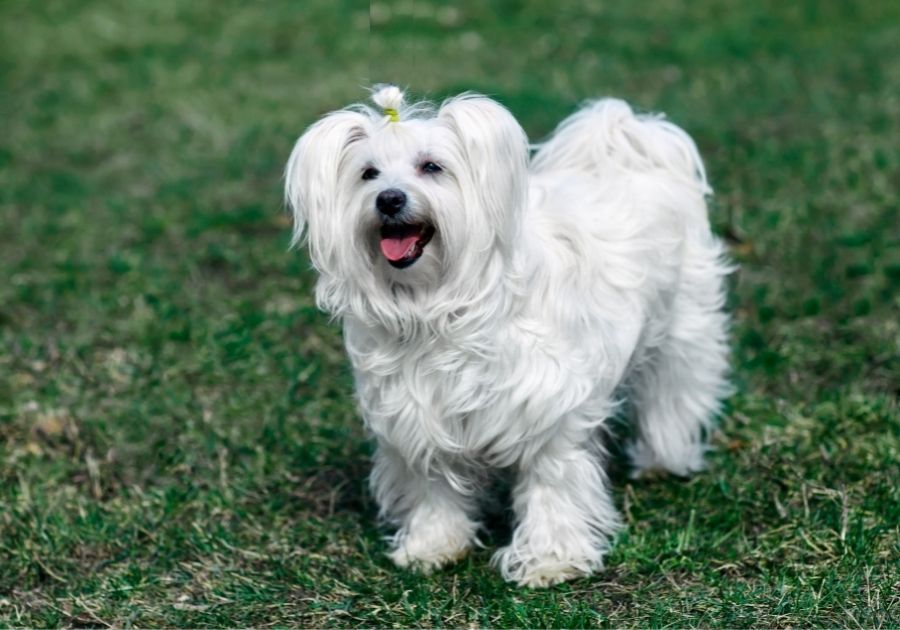
Coton de Tulear Origin
The Coton de Tulear is a native of Madagascar, and is said to be related to the Bichon Frise and also the Maltese.
It probably came into existence when the Maltese was being saved from extinction and got into Madagascar, where it was bred into what we know today as the Coton de Tulear.
In Madagascar, this breed rose to become the companions of the royal class and nobles, though some remained on the streets.
In the 1970s, the Coton de Tulear got into France thanks to an unnamed fellow. It was in France that the Coton de Tulear got established as a breed.
During that same period, the breed got into North America. In 1993, the United States of America Coton de Tulear club was formed.
However, it wasn’t till 2014 that the American Kennel Club recognized the breed after first putting it under the Foundation Stock Service.
Coton de Tulear Physical traits
Though the Coton de Tulear is small, it doesn’t belong to the Toy Group. The American Kennel Club classified it under the Non-Sporting Group.
Males are bigger than females. The male Coton de Tulear weighs between 9 and 13 pounds with a height that gets to 12.5 inches.
The female Coton de Tulear weighs between 8 and 11 pounds with a height that gets to 11 inches.
The Coton de Tulear is a white fluffy dog with a coat that is thick, soft, and long.
You might find some gray or red-roan shades on the skin, but white remains the predominant color.
The Coton de Tulear is a low shedder and considered hypoallergenic but has a high grooming need.
Coton de Tulear Personality traits
The Coton de Tulear loves people and forms a strong attachment to its family.
Separation anxiety is a huge problem with this breed, so it is not advisable for busy people who live alone.
The Coton de Tulear loves attention and thrives when it is a part of family activities.
There are some gender differences in the personality of the Coton de Tulear. Females tend to be more independent and may have a dominant streak. This can affect your choice.
Also, this breed is intelligent and easy to train. It has a manageable energy level, too, and will be content with a walk.
This, added to the size, makes it suitable for urban dwellers.
Maltese Dog Breed – All You Should Know
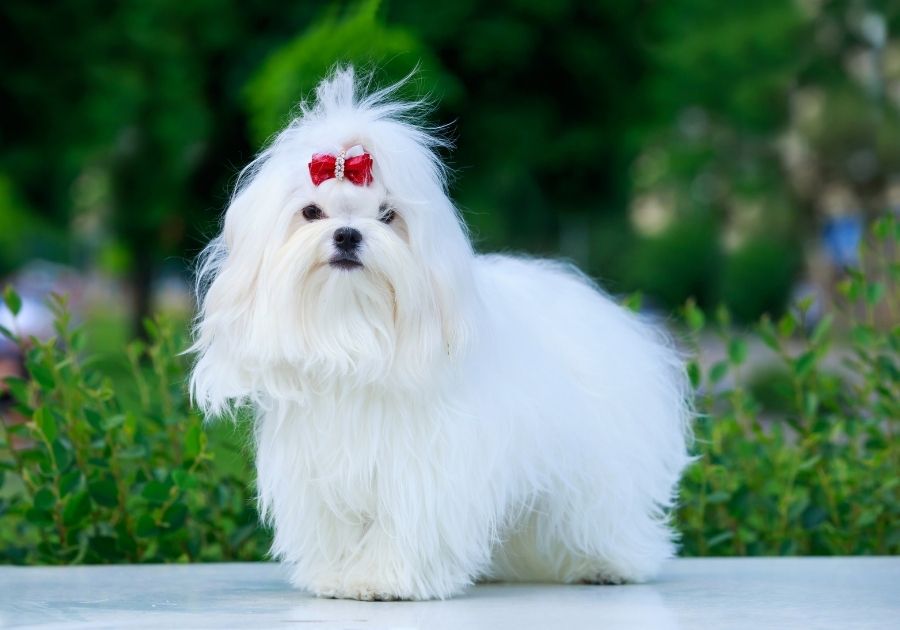
Maltese Origin
The Maltese is an old dog breed, one of the oldest there is. Its ancestry goes back 2,000 years, and this is probably why its place of origin is under debate.
While the majority agree that the Maltese come from the Isle of Malta, others argue that it came from Italy. A third party places it in Asia.
Whatever the truth is, one thing is for certain: The Maltese has always been revered, and the evidence abounds.
In Ancient Greece, people built tombs for their Maltese dogs, and artists got inspiration from them.
Egyptians believed that the Maltese could cure disease, so this breed was their equivalent of a “Get well” card. They dubbed it “The Comforter,” a name we feel was well deserved.
In the 15th century, the Maltese caught the attention of the French noble class.
From there, this breed got into Britain, where prominent personalities like Queen Elizabeth I and Queen Victoria.
The Maltese faced a critical moment in its history when breeders attempted a failed experiment on it.
For some reason, they thought it wise to try and breed down the Maltese to the size of a squirrel.
To save it, breeders combined Poodle mixes, Miniature Spaniels, and East Asian miniature dogs.
These combinations contributed to the development of some breeds like the Havanese and the Bichon Frise.
The Maltese as we know it now is credited to British breeders. In the 1800s, the Maltese got into the United States. It got recognized by the American Kennel Club in 1888.
Maltese Appearance and Physical Traits
As a toy dog, the Maltese is small. Males and females share the same pound, which shouldn’t exceed 7 pounds.
Males are taller, however, by an inch. While their height range falls between 8 and 10 inches, the female’s height range falls between 8 and 9 inches.
Some breeders sell “Teacup Maltese” that weigh less than 4 pounds, but those are prone to health problems.
The Maltese has a long, lovely coat that’s silky to the touch and straight. It falls around the Maltese head and gets to the ground.
White is the only acceptable color this breed can have. It isn’t a high shedder and is considered hypoallergenic, but that doesn’t make it easy to groom. That long hair needs a lot of work.
Overall, the Maltese looks like a white stuffed teddy bear with its round, black eyes and floppy ears. Adorable is its middle name.
Maltese Personality Traits
The Maltese is a true companion and a bold lover of people. It doesn’t shy away from meeting strangers and can befriend a visitor within minutes.
Because of its cute features, hardly anyone would be afraid of it, even those who aren’t “dog people.”
It is easy to spoil this breed, especially when you get enamored by it, but the fear of small dog syndrome should be enough to let you know this breed needs training.
Fortunately, the Maltese is one of the easiest dogs to train, and it responds well to positive reinforcements. This makes it an excellent choice for a first-time owner.
The Maltese is also intelligent and very adaptable. It can live in an apartment as well as a large house.
It is energetic, but because of its size, anyone can manage it. It also makes a good watchdog because it is observant.
The biggest challenge you’d face with the Maltese is one that’s common to all companion dogs: separation anxiety.
Coton de Tulear vs Maltese – Similarities and Differences
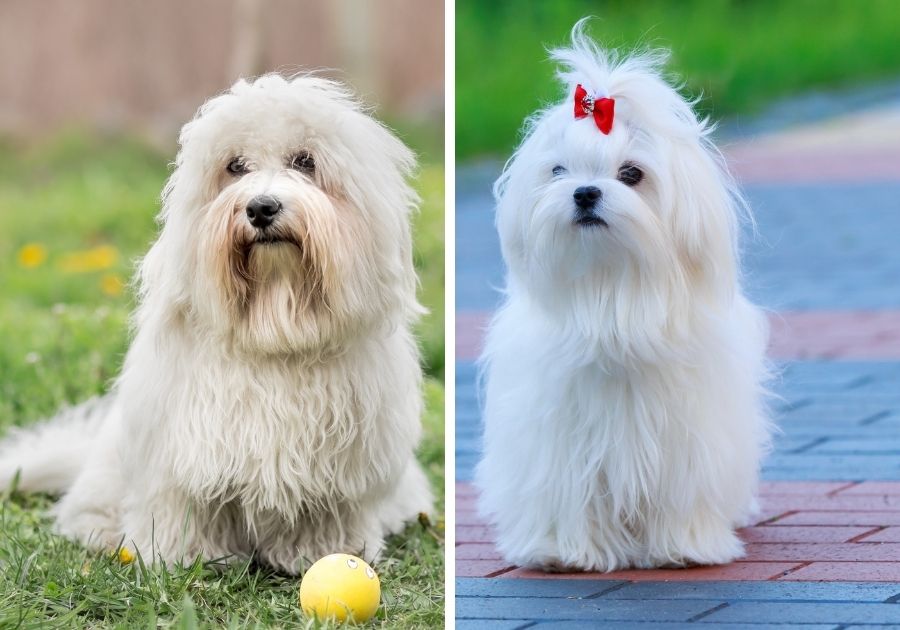
From all that precedes, you should have picked up some common and divergent points in the breeds.
We will expand those similarities and differences in the different categories below:
Size
Both the Maltese and the Coton de Tulear are small dogs, but the Coton de Tulear is slightly bigger.
We compared the height and weight of the Coton de Tulear in the table above, but here’s a recap.
The Coton de Tulear weighs between 8 and 13 pounds, while the Maltese falls at 4 to 6 pounds. The Coton de Tulear is also 2 inches taller.
For many pet parents, this size doesn’t matter. Because the Maltese is more popular, some might assume the Coton de Tulear is a bigger Maltese or a Maltese mix.
But those who are more particular about little details will find this information useful.
AKC Group
The American Kennel Club recognized the Maltese and the Coton de Tulear under two different groups.
The Maltese is a toy group, while the Coton de Tulear is in the Non-Sporting Group.
Chances are, the latter was found to be too big to fit as a Toy, hence the different classification.
Energy
The Maltese tends to be more energetic than the Coton de Tulear and may sometimes be more playful.
Either way, both don’t need a high level of exercise because of the small size.
They can’t go jogging, hiking, or any intensive activity. Those are best reserved for working dogs.
For the Maltese and the Coton de Tulear, ensure you give them daily walks for at least 30 minutes. It can also join in some games or play with the family.
When outdoors with either the Maltese or the Coton de Tulear, put them on a leash so they won’t wander.
If you’re at a dog park or you have a yard they can play in, watch out for dognappers.
Temperament
There’s hardly any difference between the Maltese and the Coton de Tulear in terms of temperament.
Both are affectionate, people-pleasers, and clingy. They are also intelligent and can suffer from separation anxiety.
That said, the Coton de Tulear tends to be more spirited than the Maltese and can sometimes be tough. However, it tends to be on the calmer side compared to the Maltese.
Coat Type and Color
The Maltese and the Coton de Tulear have the same white color, but the coat texture isn’t the same.
The Maltese has a long silky coat, while the Coton de Tulear has a short soft coat.
Both are low shedders and are considered hypoallergenic, but their coats aren’t easy to take care of.
The Maltese has a higher grooming need, though. It should be brushed daily so the coat won’t get tangled. It should also be bathed like once a week.
The Coton de Tulear should be brushed three to four times a week and doesn’t require as many baths as the Maltese.
Trainability
Both breeds are excellent for first-timers because they are both intelligent and easy to train. They love pleasing their owners and are generally cooperative.
Because of their lovely nature, many people succumb to the temptation of spoiling them. However, the best thing you can do to these dogs is to train them, not overpamper them.
Though friendly, these dogs should be socialized to avoid shyness developing.
By taking them out to meet new people, they easily learn to accommodate strangers, and their sweet side will show.
Obedience training is necessary, as well as house-training because these two breeds are often indoors.
Teach them basic commands to obey, and how to behave indoors (including where to take care of potty business).
Overall, there isn’t any noticeable difference in the trainability of these breeds.
Friendliness towards kids and pets
The Maltese and Coton de Tulear are both friendly towards kids, but they don’t do well in a house with toddlers.
They are more suitable for older kids, though the Coton de Tulear can tolerate noisy toddlers better than the Maltese as long as they don’t mistreat it.
Both breeds also flow well with other pets, but the Coton de Tulear tends to be friendlier towards animals. The Maltese can pick up a fight, even with a bigger dog.
Feeding
A high-quality diet is required for the Maltese and the Coton de Tulear. Because the latter is bigger, it might need more quantity.
Protein is essential for both breeds, as well as other important nutrients like vitamins and Omega-3 fatty acids.
The Maltese requires around ¼ to ½ cups of food each day, while the Coton de Tulear should be fed around ¾ cups.
Both breeds should be fed twice a day, and their meal should be measured so they won’t add excessive weight.
Health and Lifespan
The Maltese and Coton de Tulear are both healthy breeds and are known to have long lifespans.
Long life is an attribute that’s common to many small dogs, so that isn’t surprising. The Coton de Tulear has a longer lifespan, however.
It is expected to live up to 16 years while the Maltese often peaks at 15 years.
These breeds are susceptible to some illnesses, and as a potential pet parent, you should keep these in mind while making your choice.
The Maltese is vulnerable to illnesses like Patellar Luxation, Hypoglycemia, Progressive Retinal Atrophy, and Collapsed trachea.
The Coton de Tulear is also susceptible to Patellar Luxation and Progressive Retinal Atrophy. Added to those is hip dysplasia.
Price
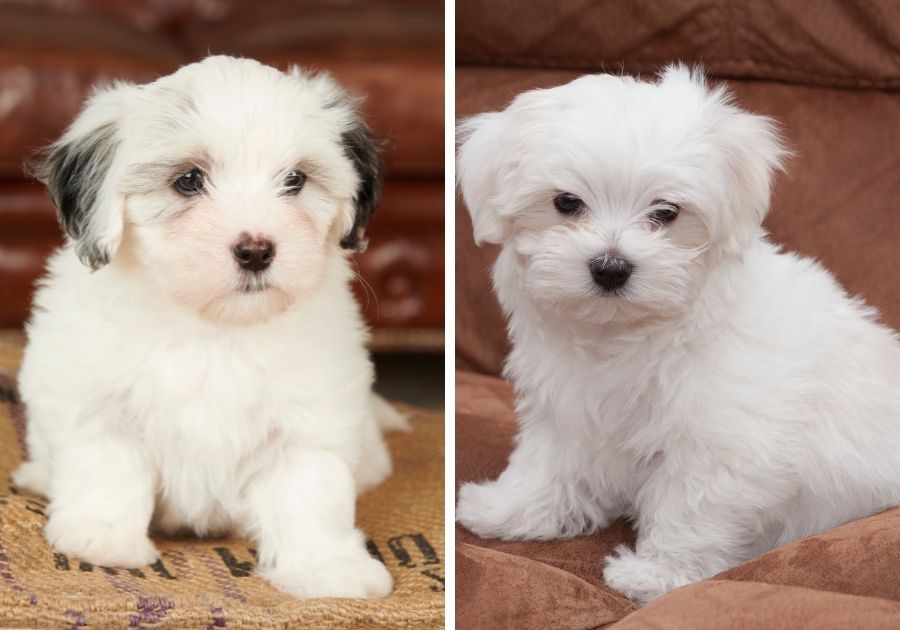
The Coton de Tulear is less popular than the Maltese, and because it is harder to find, breeders tend to charge more.
While the Maltese puppy costs between $600 and $2,000, the Coton de Tulear puppy costs between $2,000 and $4,000.
The Coton de Tulear and Maltese both belong to the Bichon family, a category of dog breeds that regroups dogs like the Havanese and the Bichon Frise alongside them.
This accounts for the resemblance between these breeds.
How do I know if my dog is a Coton de Tulear?
The Coton de Tulear often comes with a white coat and some gray shadings on it. Its coat is smooth to the touch and looks fluffy. It is also bigger than the Maltese.
When in doubt, however, make sure you get a confirmation before shopping or adopting.
How do I know if my dog is Maltese?
The Maltese is more popular than the Coton de Tulear, so chances are you’d see it more. It is smaller than the Coton de Tulear, and its coat texture is silky, not smooth.
Is there a Maltese x Coton de Tulear mix?
The Maltese and Coton de Tulear were crossed to develop a mixed breed popularly called the Contonese.
Coton de Tulear vs Maltese – Which is Better?
In conclusion, at the end of the day, it all falls to choices. Neither the Maltese nor the Coton de Tulear is better than the other.
They are both distinct breeds with their set of strengths and weaknesses. With the right care from you, both will make wonderful pets.
You May Also Like:
55 Best Non-Shedding Dogs (Small & Large Breeds)

